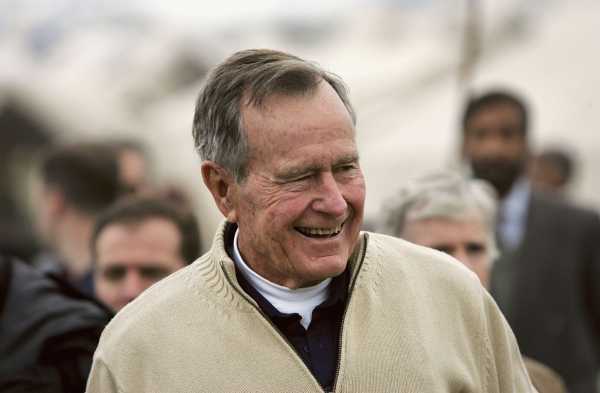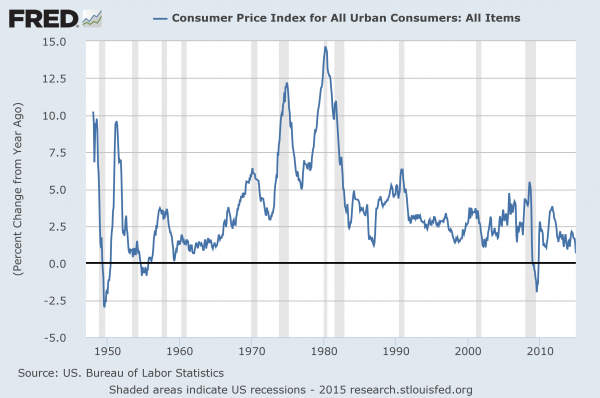
George H.W. Bush was a genuinely excellent president responsible for historic achievements that are often overlooked because of the arbitrary way we value presidential legacies.
His passing, at the age of 94 on Friday, is a perfect time to take stock of his policy accomplishments and take a broader view of his career than was visible during the extended period when he and his sons were active in presidential politics. Bush’s single term was not so long ago, but he was both the last president of the generation that served in World War II and one of the last politically influential pragmatists in the Republican Party.
From domestic affairs — where he was the last president to sign a truly bipartisan “grand bargain” — to his deft foreign policy, Bush was a president who aimed for competent management rather than ideological transformation. He had a cautious outlook, but in hindsight his presidency was marked by acts of political courage.
A little over a year ago, a darker side of the elder Bush emerged. Seven women came forward individually to describe similar accounts of Bush groping or grabbing them inappropriately while taking photographs. The accusations are as recent as 2016 and date back to 1992, when a woman said Bush grabbed her rear end while taking a photo at a fundraiser for his re-election campaign. Another woman said she was 16 when Bush, then 79, did something similar to her.
These accusations were not discussed publicly or reported at the time Bush was in office. He lost his reelection in 1992 and became an ideological pariah — too moderate to be beloved as a champion of lost causes and too politically unsuccessful to be celebrated as a shrewd operator.
Yet his defeat had little to do with anything under his control. Presidential policy is important economically, but presidents have limited influence over the short-term ups and downs of the business cycle. He was done in by a sluggish recovery deliberately engineered by a Federal Reserve that, somewhat outrageously, was pursuing a policy of “opportunistic deflation” that hurt the financial interests of middle-class Americans. Millions of Americans suffered unnecessarily long spans of joblessness and sluggish job growth as a result, and Bush himself became a collateral victim of this policy, which sent him into a spiral of obscurity.
A pretty good domestic policy
Many fond punditocratic reminiscences of the Bush era focus on his 1990 budget deal. This was, indeed, exactly the kind of deal that pundits love. The budget deficit was too high, a Republican was in the White House, and Democrats controlled Congress, and so they made a deal that raised taxes and cut spending. It was, in other words, exactly the sort of “grand bargain” on the budget that groups like Fix the Debt spent all of 2011 and 2012 chasing. The ill use to which this concept has been put in subsequent years can make a person cynical about the original — but it was a good thing to do, and the subsequent course of the Republican Party has underscored that real courage was involved.
But there’s more to his domestic policy than this. Bush signed the Americans With Disabilities Act, signed a law expanding legal immigration to the United States, signed Clean Air Act amendments that tightened regulation of air pollution, and repeatedly clashed with the National Rifle Association.
Of course, this all came in the context of a Democratic Congress. A Bush administration with Republican majorities at its back doubtless would have governed differently. But Bush successfully avoided gridlock and made steady progress on a number of important issues. Clearly, there are more consequential presidents out there. But Bush’s record of achievement on domestic issues stands up fine next to, say, the beloved Bill Clinton.
A masterful foreign policy
It is, of course, on foreign policy that Bush truly left his mark. The Persian Gulf War stands out here. It was a just cause, defending the international legal and moral norm against cross-border invasions. It was conducted through the proper channels, authorized by the UN Security Council and backed by a broad range of states in the region and around the world. It was successful. It was undertaken at low cost. And it was prosecuted in the face of substantial — and largely misguided — domestic opposition from Democrats who wrongly feared that it would be “another Vietnam.”
This was put in the context of a larger regional policy.
The Oslo Accords signed during the Clinton administration were more famous, but they built on diplomatic breakthroughs achieved at the Madrid Conference called by the Bush administration. One crucial element of the backdrop to Madrid is that Bush successfully defied Israel’s friends in Congress to deny Israel loan guarantees until Israel came to the bargaining table with the Palestinians. Bush’s three successors in the White House have all invested significant time and energy in peace talks, but have never managed to successfully use American support for Israel as a lever to move the needle.
But Bush’s real triumph was the conclusion of the Cold War.
The primary heroes in the liberation of Eastern Europe from communist dictatorships are, of course, the Eastern Europeans who liberated themselves. But the disintegration of the Soviet Empire posed some real challenges for American foreign policy. British Prime Minister Margaret Thatcher was bitterly opposed to German reunification, for example. John Mearsheimer spoke for many foreign policy specialists when he warned that absent an anti-Soviet alliance, great power conflicts would reemerge in Eastern Europe. And had the United States simply dissolved the security architecture put in place by the Truman administration, it might have happened.
Instead, Bush managed to sell both Thatcher and Mikhail Gorbachev on the creation of a unified Germany inside the NATO alliance, while beginning to pivot the alliance to a new global role.
A darker side
A darker, disappointing picture of Bush has emerged in the last year. Eight women have said publicly that he groped them inappropriately.
Initially, the Bush press shop copped to the behavior and blamed his declining wits and health on his actions in recent years. But the accusations kept coming. One dates back to 1992.
“All the focus has been on ‘He’s old.’ OK, but he wasn’t old when it happened to me,” a woman, now 55, told CNN about an incident she said happened in 1992. “I’ve been debating what to do about it.”
Bush is the first president to pass away since the era of #MeToo began, raising questions about how we’ll grapple with alleged misdeeds of men in power against their contributions as leaders in their respective fields.
It’s the economy, stupid
“I don’t think anybody around the table wants a recession or is seeking one, but sooner or later we will have one,” said Philadelphia Federal Reserve Bank President Edward Boehne at a 1989 meeting of the Fed’s Open Market Committee. “If in that recession we took advantage of the anti-inflation impetus and we got inflation down from 4.5 percent to 3 percent, and then in the next cycle we were able to keep inflation from accelerating … we could bring inflation down from cycle to cycle just as we let it build up from cycle to cycle, that would be considerable progress over what we’ve done in other periods in history.”
Boehne was proposing a strategy known as “opportunistic disinflation,” and it killed Bush’s political fortunes.
The premise of opportunistic disinflation was that Paul Volcker’s success in reducing inflation from the double-digit levels of the 1970s down to the 4 percent or so rate that prevailed during the Reagan administration wasn’t good enough. Though 4 percent inflation wasn’t so bad as to be worth deliberately provoking a recession over, the Fed should try to get it lower. The right way to do it was to just wait for the next recession to strike, and then, instead of promoting the fastest possible recovery, let the recovery go a bit on the slow side — thus bringing down the inflation rate.
And it worked.

Disruptions associated with the Persian Gulf War threw the economy into recession around the middle of Bush’s term in office. The economy eventually recovered, but did so at a lower rate of inflation than had prevailed before the war. The cost was that although the 1990 recession was not particularly deep, the recovery was quite slow — it took two and a half years for the number of employed people to fully recover from where it had previously been. This was devastating to Bush’s political fortunes, and public discontent with the weak state of the economy — a weakness that was deliberately inflicted by the Federal Reserve — helped sweep Clinton into office.
A political orphan
In politics, nothing succeeds quite like success. Bush’s approach has fallen into disfavor with the conservative movement in part because of real ideological betrayals. But nobody ever governs as a true ideological purist. Ronald Reagan raised taxes and withdrew American troops from Lebanon. George W. Bush added an expensive new entitlement to Medicare.
But Bush compromised and then he lost, giving succor to every ideologue’s fondest dream, that the path to electoral glory lies in rigid adherence to the pure faith.
His personal integrity is stained, too, as the stories of allegedly groping women pile up. His persona of a gentleman pragmatist doesn’t stand up so well when many women independently describe similar incidents.
But what ultimately brought Bush down had nothing to do with that, or a budget deal or the failure to march on Baghdad. It was the economy, stupid — as the team that beat him well knew. But taxes and war are exciting, and the Federal Reserve is boring. So Bush became an ideological pariah and the GOP has become a dogmatically anti-tax party, even as his sons continue to be among its leading politicians.
Sourse: breakingnews.ie
0.00 (0%) 0 votes


































